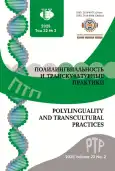Two Printing Presses of Kadir Natkho, or A Writer of the Transcultural Borderland
- Authors: Tkhakakhova K.S.1
-
Affiliations:
- Kabardino-Balkarian State University named after Kh.M. Berbekov
- Issue: Vol 22, No 2 (2025)
- Pages: 395-407
- Section: LITERARY SPACE
- URL: https://journal-vniispk.ru/2618-897X/article/view/326859
- DOI: https://doi.org/10.22363/2618-897X-2025-22-2-395-407
- EDN: https://elibrary.ru/SQQJWE
- ID: 326859
Cite item
Full Text
Abstract
Based on the aphoristic expression of S. Kellman “Every translingual writer is translingual in his own way”, the author of this article examines the distinctive features of the linguistic biography of the Adyghe-American prose writer Kadir Natkho (1927-2021). It was revealed that the writer spoke four languages - Adyghe, Russian, Arabic, English. It is shown that the main catalyst for K. Natkho᾿s multilingualism was a series of dramatic and tragic events associated with the Second World War, forced emigration, a seven-year stay in Jordan and final resettlement to the United States of America in the mid-twentieth century. Knowledge of many languages predetermined the density of the intertextual space of K. Natkho᾿s works (“Nicholas and Nadyusha”, “Old and New Tales of the Caucasus”, “In Search of Oneself”, “The Legend of the Great Abduction»), the presence of a large number of references to other ethnic cultures. It has been established that, despite the globality of the artistic thinking of the international writer, the priority role is given to the native language: Circassian realities, integrated into the flesh of his artistic texts, demonstrate the Cosmo-Psycho-Logos of the Caucasian peoples, the specific features of their mentality, material and spiritual culture.
About the authors
Karina S. Tkhakakhova
Kabardino-Balkarian State University named after Kh.M. Berbekov
Author for correspondence.
Email: karina-t-00@mail.ru
ORCID iD: 0009-0001-6352-8043
Postgraduate Student of the Department of Russian and Foreign Literature
173 Chernyshevsky St, Nalchik, 360004, Russian FederationReferences
- Abdokova, M.B. 2006. “The theme of the father᾿s home, the world of natural and musical images in the works of Kadyr Natkho.” University news. North Caucasus region. Social Sciences. Appendix, no. 3, pp. 56–61. Print. (In Russ.) EDN: HSOSWZ
- Akhidzhak, B.N. 2018. “Representation of traditional ethnic consciousness in the artistic texts of Kadyr Natkho.” Polylinguality and Transcultural Practices, vol. 15, no. 3, pp. 387–394. Print. (In Russ.) Х-2018-15-3-387-394. https://doi.org/10.22363/2618-897 EDN: YLXEZF.
- Zhachemuk, Z.R. 2015. “Literature of the Adyghe diaspora and artistic originality of the novel ‘Alienated’ by Kadyr Natkho.” Heritage of the centuries, no. 2, pp. 123–126, 30 March 2025, http://heritage-magazine.com/wp-content/uploads/2015/10/2015_2 Zhachemuk pdf EDN: VPJICT
- Shazzo, K.G. 1992. “Survival Temperature.. Afterword to the novel.” In Natho, K.I. Alienated. Maykop: Meoty publ., pp. 322–336. Print. (In Russ.)
- Gachev, G.D. 2003. Mentality of the peoples of the world. Moscow: Eksmo Publ., ISBN: 5-699-02497-2 EDN: QOCYIZ. Print. (In Russ.)
- Dzhusoity, N.G. 1957. About national style and national language. Literaturnaya gazeta, Oct. 7. Print. (In Russ.)
- Khugaev, I.S. 2013. “On the boundaries and criteria of national translingual literature.” Vestnik Vladikavkaz scientific center, vol. 13, no. 1, pp. 2–6. Print. (In Russ.) EDN: PXVEUV
- Bakhtikireeva, U.M. 2021. “Russophone — Russophone — Russophony — Russophone literature — global or local words?” The Humanities and Social Studies in the Far East, vol. XVIII, no. 1, pp. 11–17. Print. (In Russ.) https://doi.org/10.31079/1992-2868-2021-18-1-11-17 EDN: TMDVAB
- Tokareva, N.A. 2024. “Russian-speaking, bilingual, translingual, transcultural.” In National literatures of the Volga region and the Urals: research paradigms and practices: materials of the All-Russian scientific-practical seminar. Co-edited by L.Sh. Galieva and F.H. Minullina. Kazan: Institute of Language, Literature and Art named after G.I. Ibragimov, pp. 321–328. Print. (In Russ.) EDN: XWUIAO. Print. (In Russ.)
- Bakhtikireeva, U.M., O.A. Valikova, and N.A. Tokareva. 2021. “On ‘Agora’ today: approaches to the study of translingual literature.” Philological Sciences. Scientific Essays of Higher Education, no. 6 (2), pp. 263–273. Print. (In Russ.) https://doi.org/10.20339/PhS.6-21.263 EDN: XTWQKD
- Kellman, S.G. 2019. “Translingual Writers: Introductory Notes.” Polylinguality and Transcultural Practices, vol. 16, no. 1, pp. 9–12. Х-2019-16-1-9-12. https://doi.org/10.22363/2618-897 EDN: ZARASL
- Amineva, V.R. 2020. “R. Bukharaev᾿s poem ‘Day of the Dead’: ways of self-identification of the lyrical subject.” Philological Sciences. Scientific Essays of Higher Education, no. 6 (2), pp. 292–299. https://doi.org/10.20339/PhS.6-20.292 EDN: FNVNKX
- Akhidzhak, B.I. 2018. “Ethnocultural specificity of language consciousness of a bilingual writer.” Bulletin of the Adyghe State University, series “Pedagogy and Psychology”, no. 3, pp. 17–23. Print. (In Russ.)
- Bakhtikireeva, U.M., and B.E. Shagimgereeva. 2020. “The linguistic being of a creative personality: Bakhyt Kairbekov.” The Humanities and Social Studies in the Far East, vol. XYII, no. 1, pp. 83–90. https://doi.org/10.31079/1992-2868-2020-17-1-83-89 EDN: KNINDS
- Bgazhnokov, B.Kh. 1999. Adyghe ethics. Nalchik: EL-FA publ. Print. (In Russ.)
- Tomakhin, G.D. 1988. Reali-Americanisms: Manual on Country Studies. Moscow: HSE publ. Print. (In Russ.)
- Bakhtikireeva, U.M. 2020. “Study and description of the national images of indigenous peoples of the Russian Federation through the carriers of language, folklore and literature — a realized necessity.” Preservation and development of languages and cultures of indigenous peoples. Siberia. Materials of the IV All-Russian scientific-practical conference. Abakan, 1–2 October, pp. 14–24. EDN: AODCYH
Supplementary files









